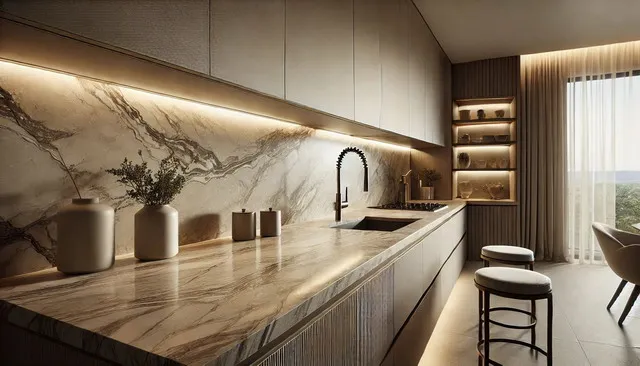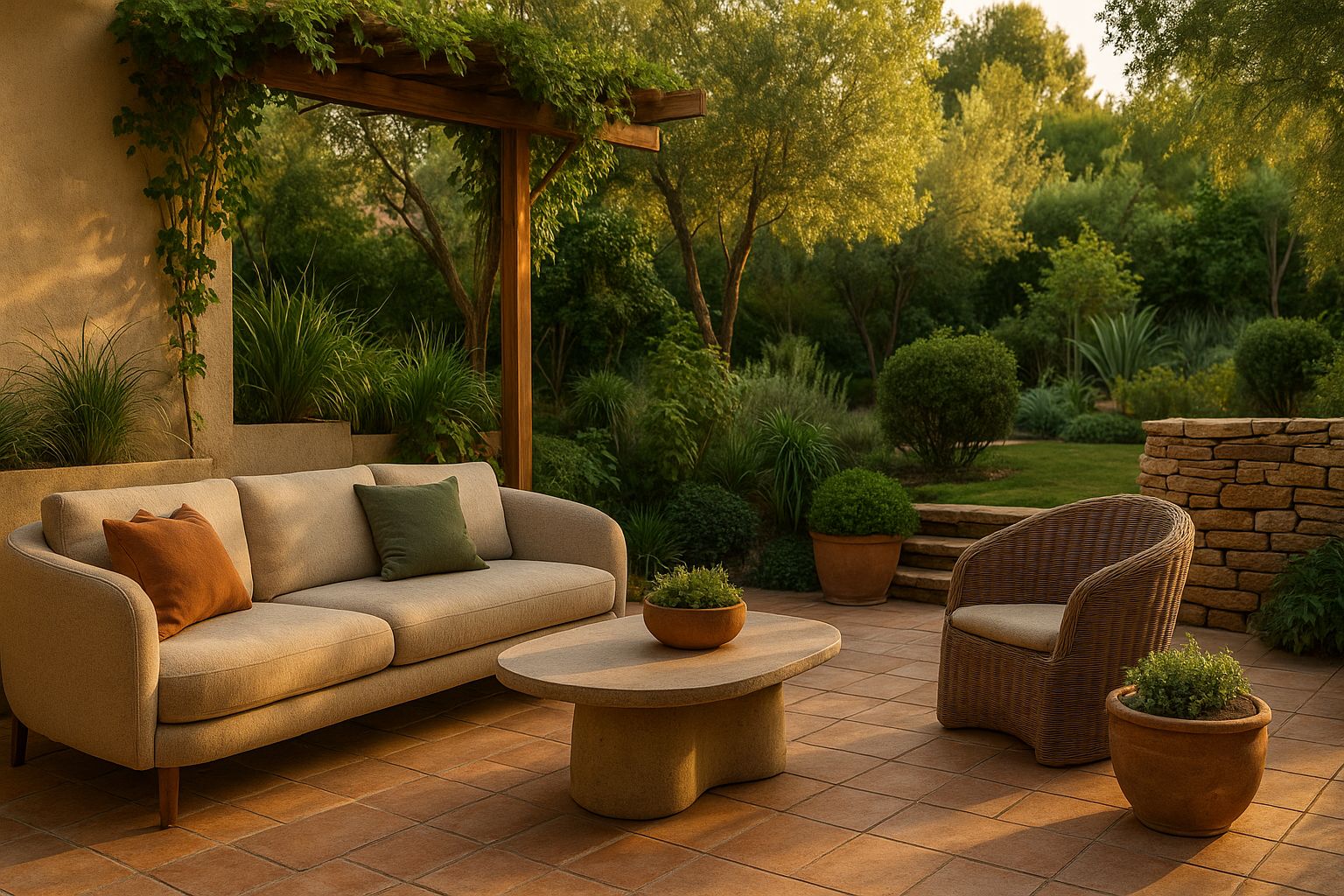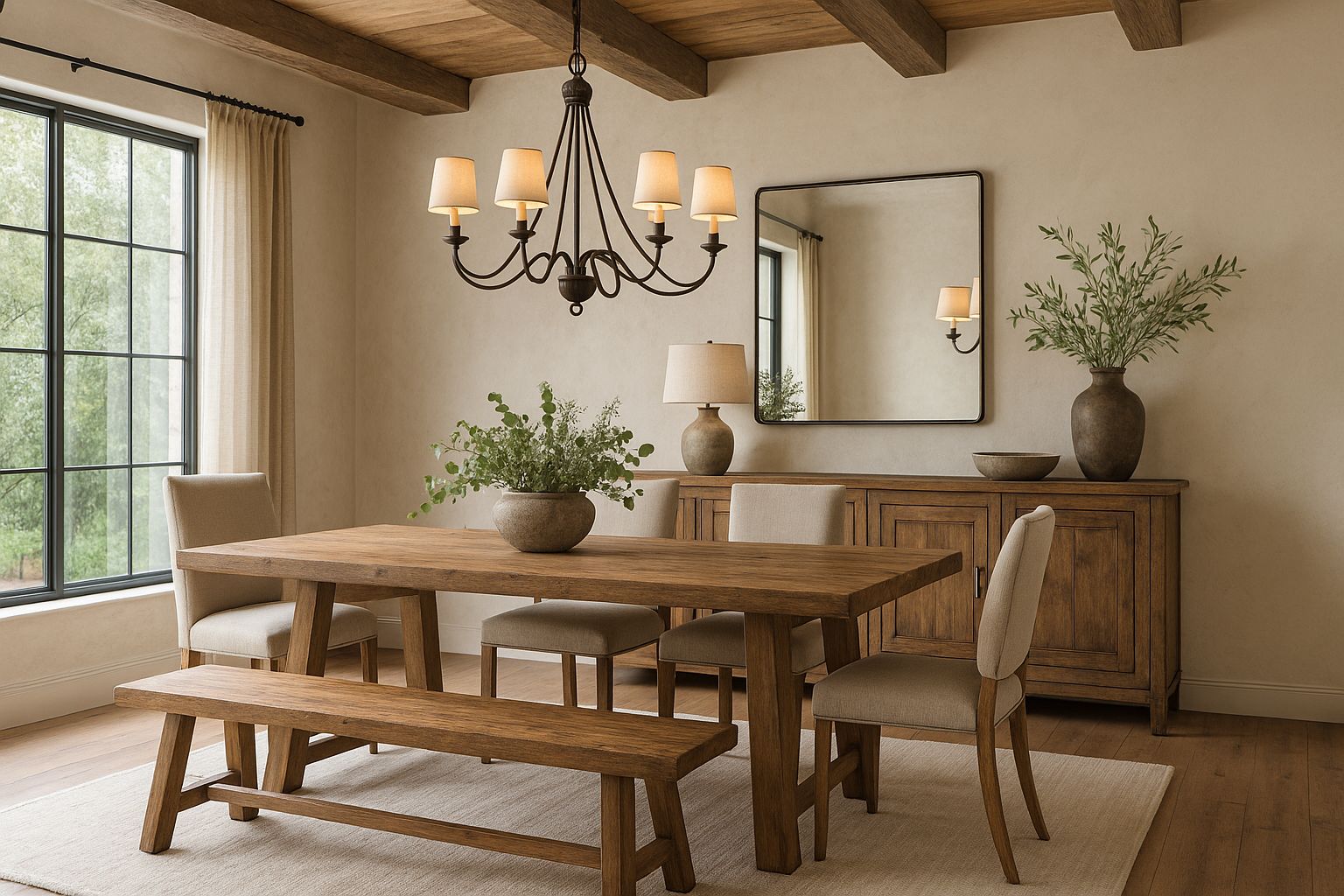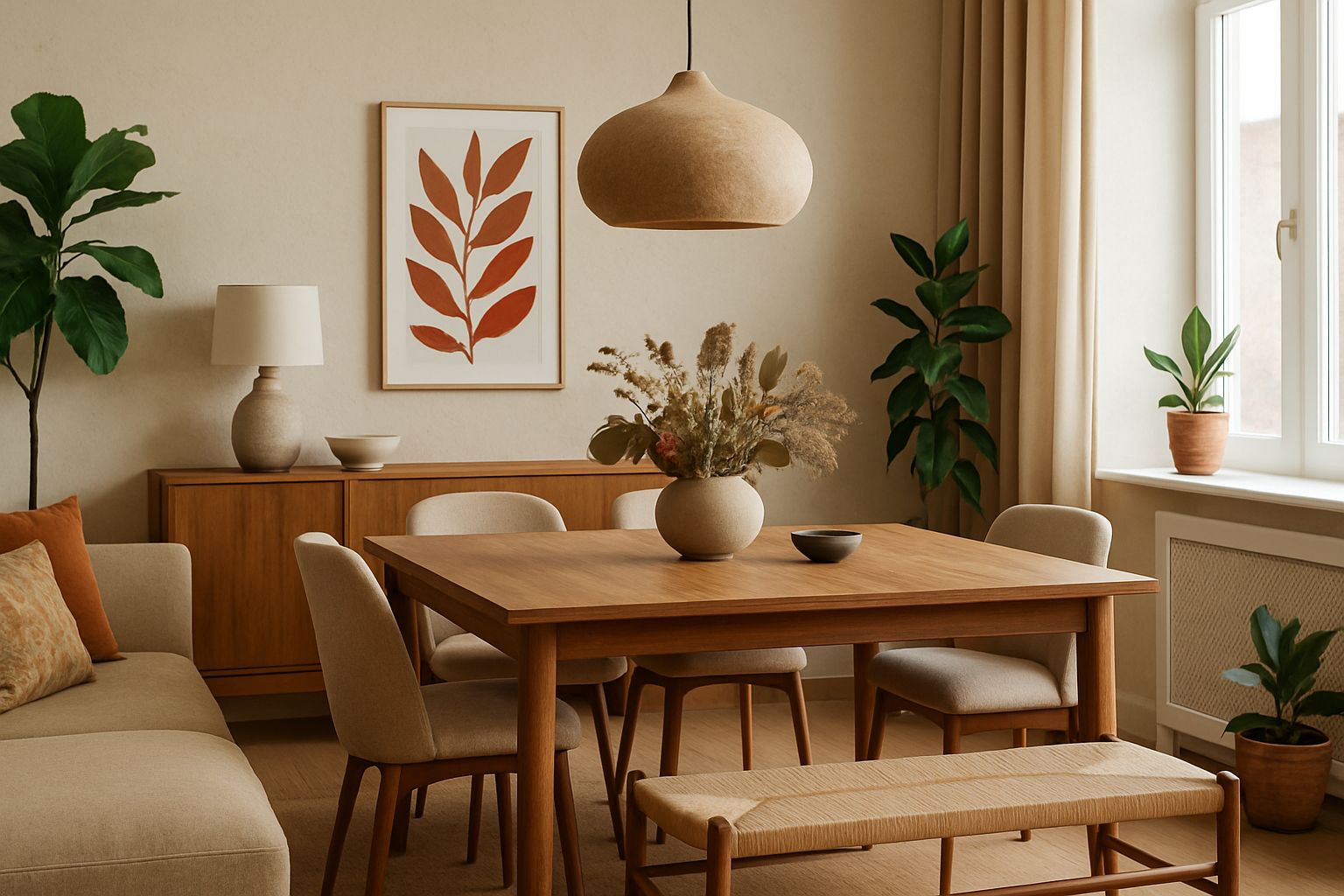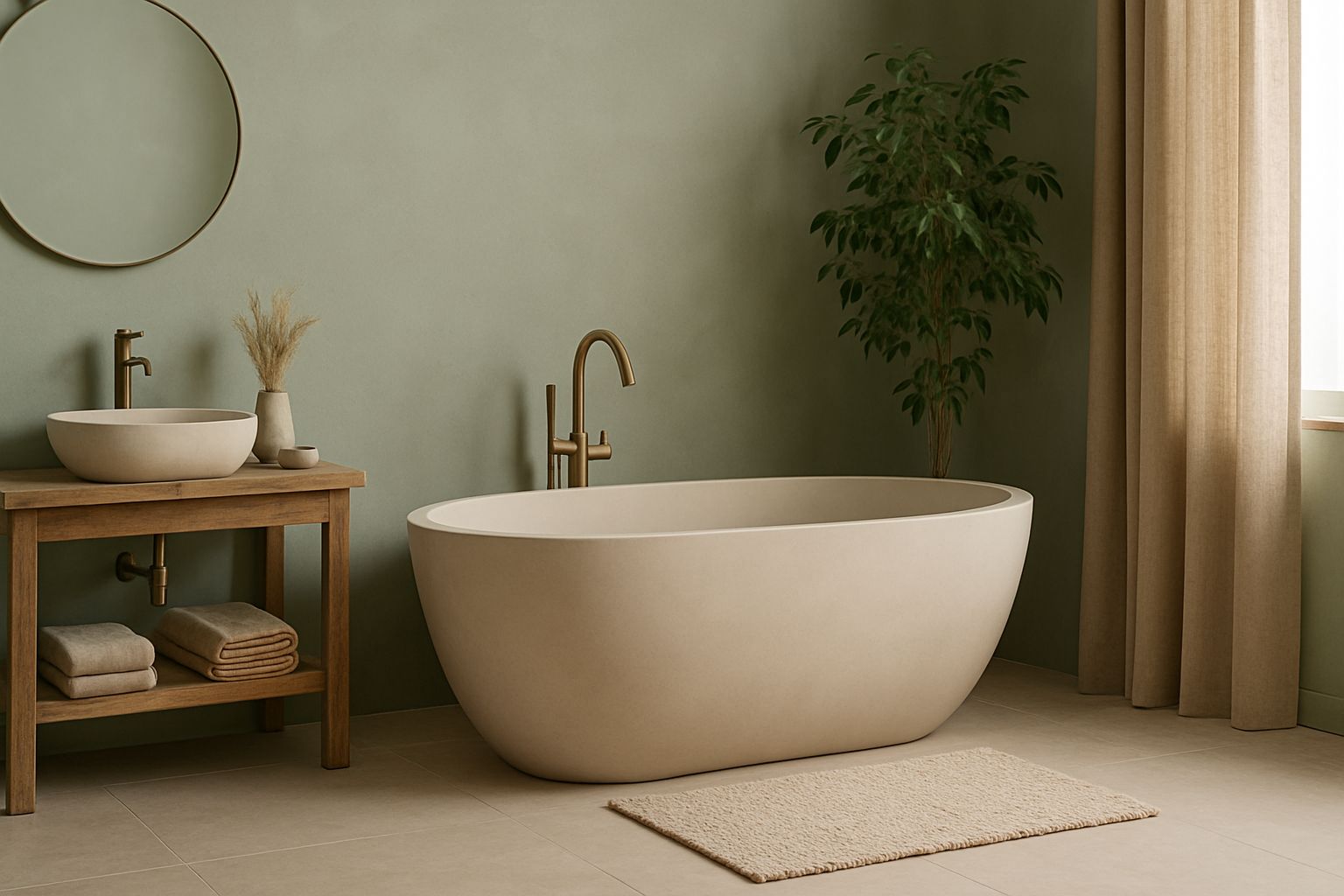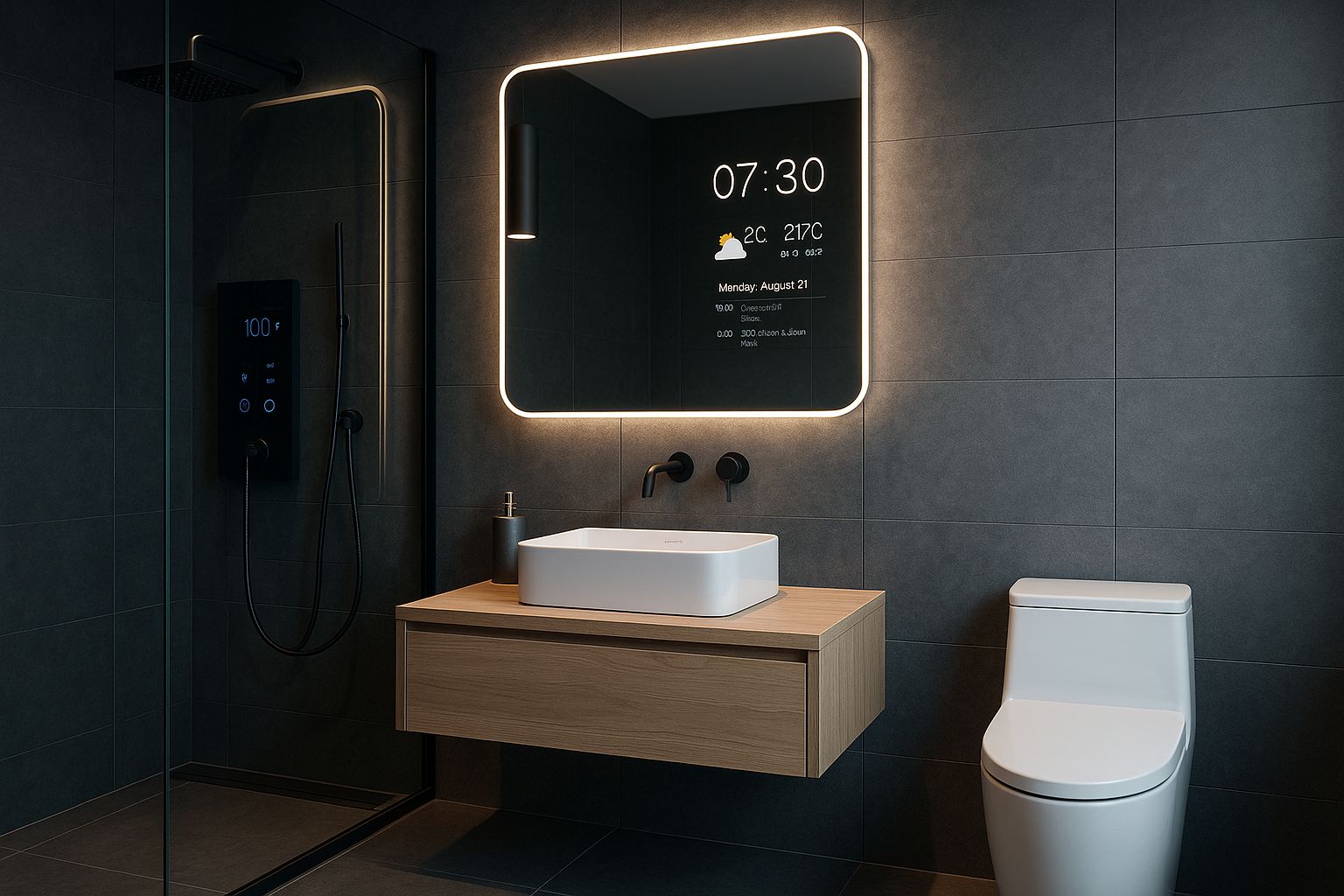Marble countertops have long been synonymous with luxury, elegance, and sophistication. Their smooth, veined surfaces have graced kitchens and bathrooms for centuries, admired for their timeless beauty and classic appeal. However, as stunning as marble may be, it’s not without its drawbacks. From its high maintenance needs to its susceptibility to stains and scratches, marble can be an impractical choice for many homeowners, especially those with busy households.
As we move into 2025, more homeowners and designers are seeking alternatives to marble that offer the same visual impact without the limitations. Modern advancements in materials and design have made it possible to replicate the look of marble using more durable, cost-effective, and sustainable options. Whether you’re looking for a countertop that requires less maintenance, is more budget-friendly, or simply suits a different aesthetic, there are plenty of marble countertop alternatives to consider.
This article explores the top alternatives to marble countertops, each offering unique advantages in terms of appearance, functionality, and cost. Whether you’re drawn to the durability of quartz, the rustic charm of butcher block, or the eco-friendly appeal of recycled materials, you’ll find the perfect countertop solution for your home.
1. Best Marble Countertop Alternatives for Modern Homes
The timeless elegance of marble countertops has been a staple in home design for centuries. Its natural beauty, veining, and luxurious appeal make it a favorite among homeowners and designers alike. However, with changing trends, evolving preferences, and practical concerns, many are seeking alternatives that offer the same visual appeal but with improved functionality. Whether it’s due to the high maintenance, susceptibility to stains, or the hefty price tag, marble is no longer the only contender in the world of countertops.
As we move into 2025, the search for the perfect countertop material continues to evolve. Homeowners are now prioritizing durability, sustainability, and affordability without compromising on style. Let’s dive into the best marble countertop alternatives for modern homes, highlighting materials that are not only practical but also striking in their own right.
Quartz Countertops That Look Like Marble
One of the leading contenders in the world of marble alternatives is quartz. Quartz countertops have steadily grown in popularity over the past few years, and for good reason. Engineered quartz is a man-made material that combines natural quartz with resins and pigments, resulting in a highly durable, non-porous surface that mimics the beauty of natural stone. The key difference? Quartz doesn’t come with the high maintenance requirements of marble.
Quartz countertops that look like marble have become a game-changer in modern home design. Brands like Caesarstone, Silestone, and Cambria offer stunning quartz designs that closely replicate the veining and patterns of natural marble, allowing homeowners to achieve the sophisticated look they desire without the associated drawbacks.
- Durability and Maintenance:
Unlike marble, which is porous and susceptible to staining, quartz is non-porous. This means it’s resistant to water, stains, and bacteria, making it an excellent choice for kitchens and bathrooms. A simple wipe with soap and water is enough to keep quartz surfaces clean and looking new. Homeowners no longer have to worry about red wine spills, lemon juice stains, or the occasional oil splatter — problems that often plague marble countertops. - Aesthetic Appeal:
Quartz manufacturers have perfected the art of mimicking marble’s veining and texture. Whether you prefer the classic Carrara marble look with soft, subtle veining or the dramatic, bold veining of Calacatta marble, there’s a quartz countertop design that suits every taste. The availability of a wide range of designs ensures that homeowners can find the perfect match for their kitchen or bathroom without having to settle for the limitations of natural stone. - Cost-Effectiveness:
While quartz is not necessarily the cheapest material on the market, it is a more cost-effective option compared to high-end marble. When you factor in the reduced maintenance and longer lifespan of quartz, the investment becomes even more attractive. Many homeowners find that the upfront cost of quartz is well worth it for the durability and beauty it brings to their homes. - Environmental Considerations:
For those concerned about sustainability, quartz is often considered a more environmentally friendly option than marble. Since quartz is engineered, manufacturers can control the sourcing of raw materials and reduce waste. Additionally, the production process for quartz countertops is more energy-efficient compared to the quarrying and transportation required for natural marble slabs.
2. Granite vs. Marble Countertops: A Comparative Guide
Another popular alternative to marble is granite. While granite has been around for decades, it continues to be a favorite among homeowners for its durability and natural beauty. When compared to marble, granite offers a different set of advantages that make it a strong contender for those seeking a natural stone countertop with fewer downsides.
- Durability and Hardness:
Granite is a much harder material than marble, which makes it more resistant to scratches and chips. This makes it a great option for high-traffic areas like kitchens, where countertops see a lot of activity. Whether you’re chopping vegetables, sliding heavy cookware across the surface, or dealing with the occasional dropped item, granite is far more likely to withstand the wear and tear without showing signs of damage. - Maintenance and Stain Resistance:
Like marble, granite is a porous material, but it’s not as porous as marble. This means that while granite countertops should still be sealed regularly to protect against staining, they are not as prone to absorbing liquids as marble is. Once sealed, granite is relatively low-maintenance, requiring only basic cleaning to keep it looking its best. Homeowners who prefer natural stone but want something more durable than marble often turn to granite for this reason. - Aesthetic Appeal and Variety:
Granite is available in a wide range of colors and patterns, from speckled designs to swirling veins. While it doesn’t offer the same delicate veining as marble, it comes in many bold, unique patterns that can add character and depth to any space. For those who appreciate the natural variation in stone, granite is an excellent choice. Each slab of granite is unique, meaning no two countertops will look the same, giving your kitchen or bathroom a truly one-of-a-kind look. - Price Comparison:
Granite is generally more affordable than marble, though the price can vary significantly depending on the rarity and quality of the stone. High-end granite options can be on par with some types of marble, but for the most part, granite offers a more budget-friendly option for homeowners who want a natural stone countertop. Additionally, the lower maintenance costs over time make granite a smart financial choice for many. - Heat and Scratch Resistance:
Granite is highly resistant to heat, making it a great choice for kitchens where hot pots and pans are regularly placed on the countertop. Marble, on the other hand, is more prone to damage from high temperatures and requires more caution. Granite’s scratch resistance also makes it a durable option for homeowners who don’t want to worry about minor mishaps leaving marks on their countertops.
3. Engineered Stone Countertops vs. Natural Marble
When it comes to achieving the luxurious look of marble without the hefty price tag and maintenance requirements, engineered stone countertops have become a popular alternative. Unlike natural marble, which is quarried from the earth, engineered stone is manufactured using a combination of natural stone particles, resins, and pigments. This blend creates a surface that is not only visually stunning but also highly functional for modern homes.
- Composition and Durability: Engineered stone countertops, such as quartz and quartzite, are designed to withstand the rigors of daily use. While natural marble is prone to scratching, chipping, and staining due to its porous nature, engineered stone is significantly more resilient. The addition of resins during the manufacturing process creates a non-porous surface that resists water, stains, and bacteria, making it ideal for kitchen countertops.
The durability of engineered stone makes it a superior choice for homeowners who want the elegance of marble without the worry of damage from everyday activities. From chopping vegetables to spilling acidic liquids, engineered stone can handle it all without losing its beauty.
- Design Versatility: One of the biggest advantages of engineered stone countertops is the wide range of design options available. Since it’s a manufactured product, engineered stone can be customized to mimic the look of virtually any natural stone, including marble. Whether you prefer the classic white marble with subtle veining or a more dramatic, bold veined design, engineered stone can be crafted to suit your style.
The consistency of engineered stone also makes it a great option for homeowners who prefer a more uniform look. Unlike natural marble, which varies from slab to slab, engineered stone offers a more predictable appearance, allowing you to achieve a cohesive design throughout your home.
- Environmental Impact: For eco-conscious homeowners, engineered stone is often considered a greener option compared to natural marble. The production process for engineered stone allows for better control over resource usage and waste reduction. Additionally, some manufacturers incorporate recycled materials into their engineered stone products, further reducing the environmental footprint.
While natural marble requires quarrying, which can have significant environmental impacts, engineered stone is manufactured in a more controlled environment. This makes it a more sustainable option for those who prioritize eco-friendly materials in their homes.
- Cost Considerations: While engineered stone countertops can still be considered a premium option, they are generally more affordable than high-end natural marble. The cost of engineered stone varies depending on the brand, design, and quality, but it typically falls within a more accessible price range for many homeowners. Additionally, the long-term savings on maintenance and repairs make engineered stone a cost-effective investment.
For homeowners looking to achieve the look of marble without breaking the bank, engineered stone provides a budget-friendly alternative that doesn’t compromise on style or functionality.
4. Concrete Countertops That Mimic Marble’s Elegance
Concrete countertops may not be the first material that comes to mind when considering alternatives to marble, but this versatile option has been gaining popularity in recent years. Known for its industrial aesthetic, concrete can also be customized to mimic the elegant look of marble, offering a unique alternative for modern homes.
- Customizability and Aesthetic Appeal: One of the standout features of concrete countertops is the ability to fully customize their design. Homeowners can choose from a variety of colors, finishes, and textures to create a countertop that suits their style. When polished and sealed properly, concrete can achieve a smooth, high-gloss finish that resembles marble, with the added benefit of being completely customizable.
In addition to color and finish, concrete countertops can also be stained or stamped to create veining and patterns similar to marble. This allows homeowners to achieve the look they desire while adding their own personal touch to the design.
- Durability and Strength: Concrete countertops are incredibly durable, making them an ideal choice for high-traffic areas like kitchens and bathrooms. While natural marble is prone to scratching and chipping, concrete is much more resistant to these issues. Additionally, concrete is heat-resistant, so homeowners can place hot pots and pans directly on the surface without worrying about damage.
However, concrete countertops do require regular sealing to protect them from stains and moisture. Without proper sealing, concrete can absorb liquids and become susceptible to staining. That said, with the right maintenance routine, concrete countertops can last for many years and retain their beauty.
- Cost and Installation: Concrete countertops are often more affordable than natural marble, especially when considering custom designs. The price of concrete countertops can vary depending on the complexity of the design and the finishes chosen, but they generally fall within a more accessible price range for homeowners looking for a unique alternative.
Installation can be a bit more labor-intensive, as concrete countertops are typically poured in place or precast to fit specific dimensions. However, the ability to create custom shapes and sizes makes concrete an attractive option for those looking for a truly one-of-a-kind countertop.
5. Butcher Block Countertops: A Warm Alternative to Marble
For homeowners seeking a countertop material that offers warmth and a rustic aesthetic, butcher block is an excellent alternative to marble. While it may not replicate the sleek elegance of marble, butcher block countertops bring a natural, inviting feel to any space.
- Natural Beauty and Warmth: Butcher block countertops are made from strips of wood that are glued together to create a sturdy surface. The natural grain patterns and rich colors of the wood add a touch of warmth to kitchens and bathrooms, creating a cozy and inviting atmosphere. Unlike the cold, hard surface of marble, butcher block offers a softer, more organic feel that complements a variety of design styles.
- Functionality and Maintenance: Butcher block countertops are ideal for homeowners who enjoy cooking and want a surface that is both functional and beautiful. The wood surface is gentle on knives, making it perfect for food preparation. However, butcher block countertops do require regular maintenance to keep them looking their best. They need to be oiled regularly to prevent the wood from drying out and to protect it from water damage.
While butcher block is not as heat- or scratch-resistant as materials like quartz or granite, its imperfections can add character over time. Many homeowners embrace the worn, lived-in look that butcher block countertops develop with use, giving their kitchen a sense of history and charm.
6. Sustainable Marble Countertop Alternatives for Eco-Conscious Homes
As sustainability becomes an increasingly important consideration for homeowners, finding eco-friendly alternatives to marble has become a priority. Fortunately, there are several sustainable countertop options that offer the beauty and elegance of marble without the environmental impact.
- Recycled Materials: Countertops made from recycled materials, such as glass, paper, and concrete, are gaining popularity for their eco-friendly benefits. These materials are often combined with resins to create durable, non-porous surfaces that mimic the look of natural stone. Recycled glass countertops, for example, can offer a striking appearance with the added benefit of being made from repurposed materials.
- Reclaimed Wood: For those who prefer a rustic, natural aesthetic, reclaimed wood countertops offer a sustainable alternative to marble. Using wood that has been salvaged from old buildings or furniture reduces the need for new timber, making it an environmentally friendly option. With proper care and maintenance, reclaimed wood countertops can last for years and develop a beautiful patina over time.
7. Porcelain Countertops as a Durable Alternative to Marble
Porcelain countertops are rapidly becoming a popular choice among homeowners looking for a durable, versatile alternative to marble. While porcelain is traditionally associated with tiles, modern technology has allowed manufacturers to create large, continuous slabs perfect for countertops. This makes porcelain a unique and stylish alternative to natural stone, offering both beauty and practicality.
- Strength and Durability: One of the key advantages of porcelain countertops is their exceptional durability. Porcelain is made from natural clays and minerals that are heated at extremely high temperatures, creating a surface that is highly resistant to scratches, heat, and stains. Unlike marble, which can be easily scratched or etched by acidic substances, porcelain is non-porous and highly resistant to damage.
In kitchens where high traffic and heavy use are common, porcelain countertops can withstand the rigors of daily life without showing signs of wear. From hot pans to sharp knives, porcelain is tough enough to handle it all.
- Design Versatility: Porcelain countertops are available in a wide range of colors, patterns, and finishes, including those that mimic the look of marble. Whether you want the subtle veining of Carrara marble or the dramatic, bold appearance of Calacatta marble, porcelain can replicate these designs while offering superior durability. The flexibility in design makes porcelain a great option for homeowners who want the look of marble but need a more practical surface.
Additionally, because porcelain slabs are thinner than natural stone, they can be installed over existing countertops, saving time and labor costs. The thin profile of porcelain also makes it a sleek and modern choice for contemporary kitchens and bathrooms.
- Low Maintenance: Porcelain countertops are incredibly easy to maintain. Since the surface is non-porous, it resists stains, water, and bacteria, making it a hygienic option for kitchens and bathrooms. Cleaning is as simple as wiping down the surface with soap and water, and because porcelain is highly resistant to chemicals, harsher cleaners can be used for more stubborn stains without damaging the surface.
Unlike marble, which requires regular sealing to protect against stains and etching, porcelain is virtually maintenance-free. This makes it an ideal choice for homeowners who want a beautiful, hassle-free countertop.
8. Laminate Countertops That Look Like Marble: Affordable and Stylish
For homeowners on a budget, laminate countertops offer an affordable alternative to marble without sacrificing style. While laminate countertops were once considered a low-cost, low-quality option, advancements in manufacturing have dramatically improved the look and feel of laminate, making it a viable option for modern kitchens and bathrooms.
- Cost-Effectiveness: Laminate is one of the most budget-friendly countertop materials available. It offers significant savings compared to natural stone and other alternatives like quartz or granite. For homeowners who want the look of marble but have a limited budget, laminate is an excellent choice.
- Design Options: One of the biggest advantages of laminate countertops is the wide variety of design options available. Modern laminate countertops can be made to mimic the look of marble, granite, and other natural stones with surprising accuracy. High-definition printing technology allows manufacturers to create realistic marble patterns, including the veining and texture of natural stone.
Laminate countertops also come in a variety of colors and finishes, allowing homeowners to choose a style that complements their overall design. Whether you want the bright, classic look of white marble or a darker, more dramatic pattern, laminate offers a wide range of possibilities.
- Ease of Installation and Maintenance: Laminate countertops are relatively easy to install, making them a popular choice for DIY projects. They can be cut to fit almost any space and are available in both pre-fabricated and custom options. Laminate is also low-maintenance, requiring only basic cleaning to keep it looking fresh.
While laminate may not be as durable as stone, with proper care, it can last for many years. However, it is important to avoid placing hot pots or using sharp objects directly on the surface, as laminate is more susceptible to heat and scratches compared to more durable materials.
9. Choosing Between Quartzite and Marble for Your Kitchen Countertops
Quartzite is another natural stone that is often considered a strong alternative to marble. While less well-known than quartz, quartzite is gaining popularity for its marble-like appearance and impressive durability. For homeowners torn between quartzite and marble, understanding the differences between these two materials is key to making an informed decision.
- Appearance and Aesthetics: Quartzite is a natural stone that often resembles marble, with beautiful veining and a similar color palette. However, quartzite tends to have a more crystalline appearance and is available in a wider range of colors than marble, including shades of white, gray, and even pink or green. This makes quartzite an attractive option for homeowners who want a unique, natural stone countertop.
While both marble and quartzite offer timeless beauty, quartzite’s more varied color options give it an edge for those looking to add a touch of individuality to their space.
- Durability and Maintenance: When it comes to durability, quartzite outperforms marble. It is one of the hardest natural stones available, making it highly resistant to scratches, chips, and etching from acidic substances. Unlike marble, which is prone to staining and requires regular sealing, quartzite is less porous and more resilient, though it still benefits from periodic sealing to protect against stains.
For homeowners who want the beauty of natural stone without the high maintenance requirements of marble, quartzite is an excellent alternative.
- Price Comparison: Quartzite tends to be more expensive than marble, especially rarer varieties of quartzite. However, the long-term durability of quartzite can make it a worthwhile investment for homeowners who want a stone countertop that will stand the test of time. The reduced need for maintenance and repair also adds to the overall value of quartzite compared to marble.
10. Solid Surface Countertops: A Seamless Marble Alternative
Solid surface countertops, such as Corian and other brands, offer a sleek, seamless alternative to marble. Made from a combination of acrylic and natural materials, solid surface countertops are prized for their smooth, non-porous finish and wide range of design options.
- Seamless Appearance: One of the standout features of solid surface countertops is their seamless appearance. Unlike marble and other natural stones, which have visible seams where slabs are joined together, solid surface countertops can be installed without seams, creating a smooth, continuous look. This makes them a popular choice for modern kitchens and bathrooms, where clean lines and a minimalist aesthetic are desired.
- Durability and Repairability: Solid surface countertops are durable and resistant to stains, moisture, and bacteria. They are easy to clean and maintain, making them a practical choice for busy households. One unique feature of solid surface countertops is their repairability. If the surface becomes scratched or damaged, it can be sanded and refinished, restoring it to its original condition. This makes solid surface countertops a long-lasting, cost-effective alternative to marble.
- Design Flexibility: Like other engineered materials, solid surface countertops are available in a wide range of colors and patterns, including those that mimic the look of marble. Homeowners can choose from a variety of finishes, from matte to high gloss, allowing for customization to suit any design style.
Conclusion
In 2025, the desire for marble’s timeless beauty continues to inspire homeowners, but practical considerations such as cost, durability, and maintenance have led many to explore alternatives. From the resilience of quartz and granite to the customizability of concrete and the eco-friendliness of recycled materials, today’s alternatives offer the perfect blend of aesthetics and functionality. Whether you’re designing a modern kitchen or updating your bathroom, there’s a marble countertop alternative that will fit your needs, style, and budget.

